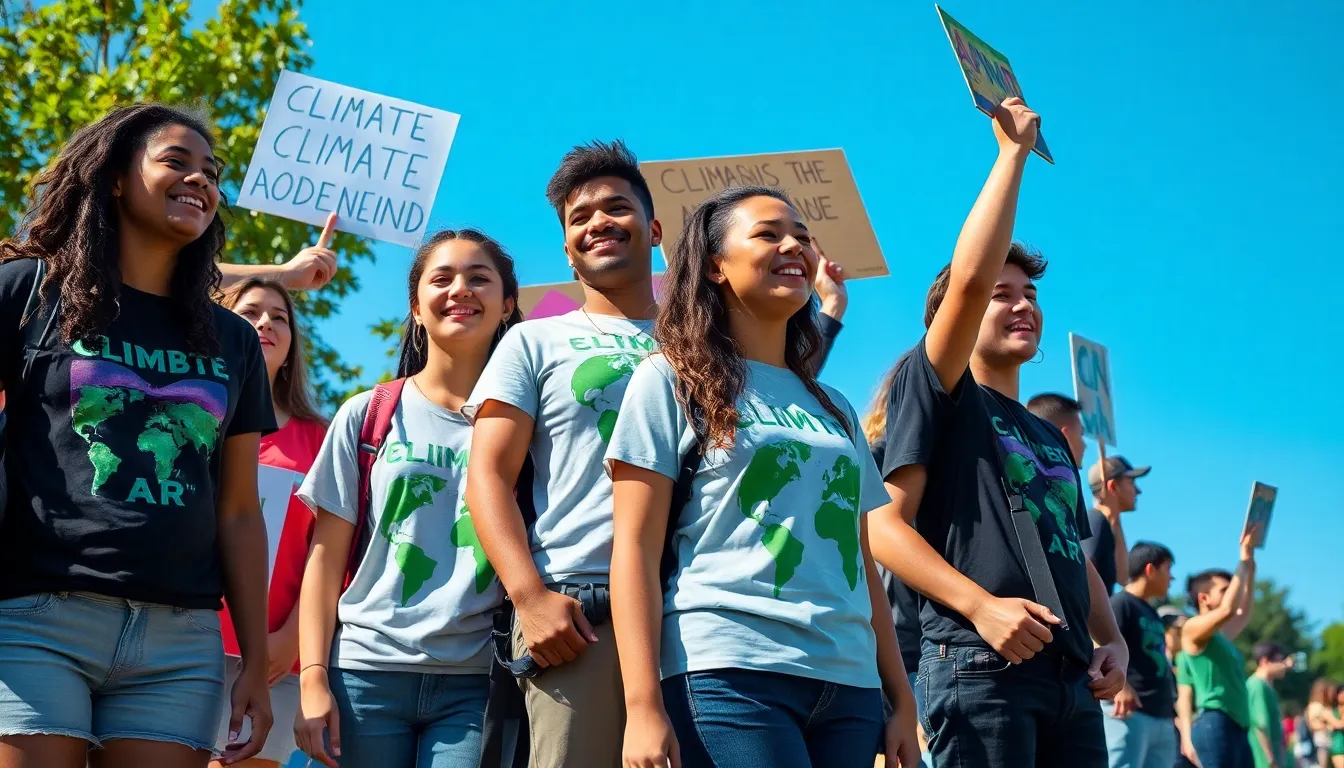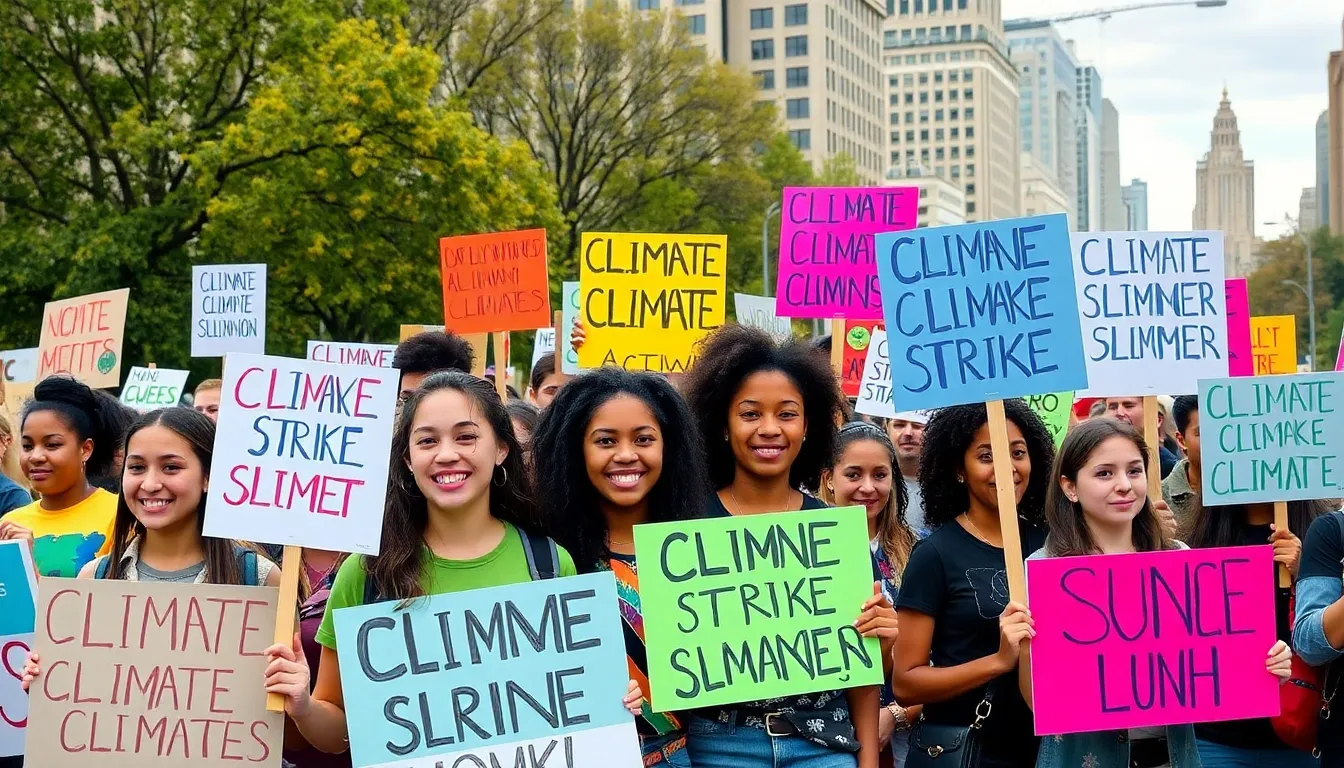In a world where TikTok dances and memes reign supreme, Gen Z is shaking up the political landscape like never before. This generation, born between the mid-1990s and early 2010s, isn’t just scrolling through social media; they’re scrolling through policies, demands, and movements that matter. With a passion for social justice and a knack for viral activism, they’re turning the political arena into their own digital playground.
Forget the stereotypes of apathetic youth; Gen Z is engaged, informed, and ready to make their voices heard. Whether it’s climate change, racial equality, or mental health awareness, they’re not just tweeting about it—they’re demanding action. As they step into their voting shoes, it’s clear that Gen Z politics isn’t just a trend; it’s a revolution that’s here to stay. Buckle up, because this generation is rewriting the rules and redefining what it means to be politically active.
Table of Contents
ToggleOverview of Gen Z Politics
Generation Z engages with politics in unique and impactful ways. Known for their digital fluency, they leverage social media platforms to mobilize and advocate for issues that matter. Activism among Gen Z spans areas such as climate change, racial equality, and mental health.
Polling data shows that nearly 70% of Gen Z members feel that social media influences their political views. Many prioritize authenticity in political communication, often favoring candidates who connect with their values. Direct action is common, with movements like #BlackLivesMatter and climate strikes gaining momentum through their efforts.
Additionally, Gen Z exhibits strong concern for environmental issues, often pushing for progressive climate policies. In recent elections, they demonstrated significant turnout rates, highlighting their commitment to influencing governance. On issues like mental health, they advocate for systemic changes rather than merely discussing the problem.
Understanding their political preferences reveals a preference for candidates that embrace inclusivity and progressive policies. Research indicates that Gen Z tends to support expansive economic reforms and universal healthcare systems.
Political engagement among Generation Z signals a shift towards action-oriented activism. As they continue to drive conversations around critical issues, their influence on the political landscape becomes increasingly prominent.
Key Issues for Gen Z

Generation Z prioritizes various key issues that significantly impact their political engagement and activism.
Climate Change
Climate change ranks at the top of Gen Z’s concerns. This generation demands urgent action to combat climate change and advocates for progressive environmental policies. Around 70% of Gen Z supports government initiatives aimed at reducing carbon emissions and promoting renewable energy sources. Young activists frequently participate in climate strikes, pushing for legislative reforms like the Green New Deal. They view climate action not just as a necessity but as a moral obligation to protect future generations. Attending protests and participating in online campaigns, they inspire others to join the fight against climate inaction.
Social Justice
Social justice issues resonate deeply with Gen Z. Racial equality, LGBTQ+ rights, and gender equality remain high on their agenda. Engaging in movements like #BlackLivesMatter, they seek to influence policy changes and address systemic inequalities. Approximately 70% of Gen Z believes that promoting inclusivity is essential for a fair society. They prefer political candidates who demonstrate a commitment to social justice through their actions. Utilizing social media platforms, Gen Z amplifies marginalized voices and educates their peers. Their activism emphasizes accountability and reform within law enforcement and social systems.
Influence of Technology
Technology greatly shapes Gen Z’s political engagement. This generation’s adept use of digital platforms facilitates their active involvement in political discourse.
Social Media Impact
Social media serves as a critical tool for Gen Z, directly influencing their political views. Nearly 70% of this demographic reports that social media shapes their opinions. Platforms like Instagram and TikTok become spaces for activism, allowing young people to share information and mobilize quickly. Campaigns such as #BlackLivesMatter gain traction, thanks to viral posts and widespread participation. Authenticity remains essential for political communication, with Gen Z favoring candidates who align with their values and demonstrate genuine engagement.
Access to Information
Accessing information is easier than ever for Gen Z, thanks to technology. They turn to online resources to educate themselves on pressing issues like climate change and social justice. Immediate access to diverse viewpoints enables them to form well-rounded perspectives. Online communities foster discussions about policy and advocacy, which empowers this generation to demand changes. Active engagement in digital forums results in informed decision-making, reinforcing their commitment to social issues that resonate deeply.
Gen Z Voter Engagement
Gen Z’s engagement in politics reflects a significant shift toward activism and participation. This generation prioritizes issues such as climate change, social justice, and mental health in their voting behavior.
Voting Trends
Voting participation among Gen Z shows remarkable growth. Approximately 50% of eligible voters aged 18 to 29 cast their ballots in the 2020 election. This turnout marks a dramatic increase compared to previous years, emphasizing their commitment to making a difference. Many in this demographic express a strong sense of urgency regarding climate policies and social equality. Research indicates that candidates prioritizing these issues resonate more with young voters. Aligning campaign messages with Gen Z values fosters stronger electoral support. Consequently, political parties increasingly target outreach efforts to engage this vital voting bloc.
Mobilization Efforts
Mobilization efforts among Gen Z are reshaping traditional activism. Digital platforms serve as powerful tools for organizing and advocating. Young activists commonly use social media to amplify their messages and reach broader audiences. In 2020, movements such as the climate strike and racial justice protests gained traction, partly through these online efforts. Grassroots initiatives flourish as individuals engage their networks to promote local and national issues. From online petitions to viral hashtags, Gen Z leverages technology to create immediate impact. This connectedness allows them to unite for causes quickly, making their collective voice more influential in the political landscape.
Generation Z is undeniably reshaping the political arena with their passionate activism and digital savvy. Their commitment to pressing social issues is not just a fleeting trend but a powerful movement that demands attention and action. As they continue to leverage social media for advocacy and mobilization, their influence will likely grow, pushing for policies that reflect their values.
This generation’s focus on authenticity and accountability in political communication sets new standards for engagement. With their increasing voter participation and dedication to causes like climate change and social justice, Gen Z is proving that they are not just the leaders of tomorrow but the change-makers of today. Their impact on politics signals a transformative era where young voices are vital in shaping a more equitable future.



